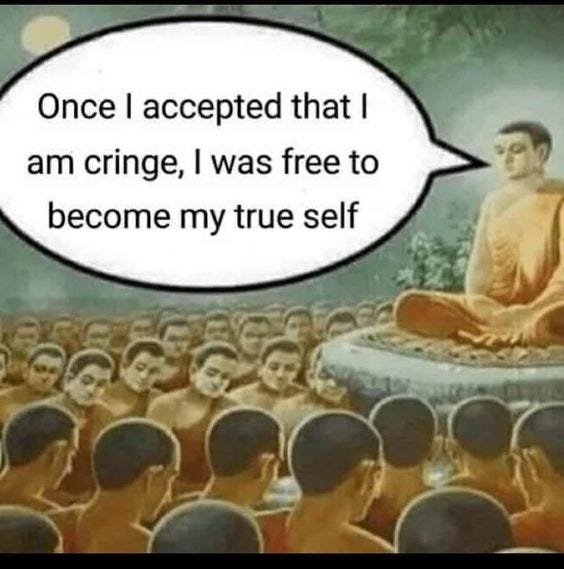Go Forth and Create Thy Cringe
We have some great events upcoming at THE STOA, including discussions on the internet as a stage, NPCs in the meta-crisis, Moloch fuckery, and more. To attend these events, you can become a member of this Substack. For more information on the events, scroll to the bottom of this entry. Additionally, there will be more in-person events in Toronto and other cities. Become a member of this Substack for updates:
Cringe is a word that simultaneously describes the sensation of acute embarrassment and the action that caused it. I like postrationalist Sarah Perry’s description of cringe as “failed emotional manipulation” the best. Cringe happens when someone attempts to invoke a certain emotional experience in another and fails hard.
At its most general, cringe is the experience of witnessing failed emotional manipulation: a theater production’s failure to induce suspension of disbelief, a joke followed by silence, a grandiose boast that fails to impress. - Sarah Perry
I cringe when looking back at things I put on the internet. I deleted an old podcast because listening to the tryhard introduction fills my body with so much cringe that it feels like I am going to explode. Even reading old entries in this newsletter from a few years ago is a painful experience. However, I instantly feel better watching TikTok cringe compilations. Gen Z’s lack of cringe-awareness is quite impressive.
 Tiktok failed to load.
Tiktok failed to load.Enable 3rd party cookies or use another browser
Noticing past cringe can hinder future creativity. Something inhibiting happens to online creators who have been doing this for a while. Personally, when I feel cringe in my body toward old content, subtle anxiety emerges, which can be translated as follows:
Oh shit, look at how cringe that was. People probably noticed at the time as well, but they were just too nice to say anything, or I was too doped up on a creative high and the corresponding validation to notice. If I lacked such self-awareness, what makes me think I don’t lack it now? I cannot risk creating again; I could create more cringe, making Future Peter’s body want to explode.
As any creative person knows, the creative spirit becomes stifled when undue anxiety fills the body. Let’s call this phenomenon “cringe-induced paralysis.” The way I handle this is by viewing my past cringe through the lens of a growth mindset:
Yes, I was unconsciously performing, attempting to invoke a specific emotional experience in others, and I failed. I did not fail with everyone because enough people vibed with what I was putting out there and were equally blind to my cringe. One man’s cringe is another man’s cool. Besides, noticing you created cringe means you are growing and becoming more sophisticated in the online creative process.
The key word is performance. Sociologist Sherry Turkle coined the phrase “second self” to describe our digital personas, created and maintained through our interactions with computers and the internet, which become an extension of our identity. When one creates content, one performs their second self as well, a potential art form in itself.
Such performances can be good or bad. The bad ones - the “failed emotional manipulations” - are growth opportunities to genuinely pretend1 better in the future. The art form of second selfing is relatively new, one we are just becoming conscious of. Creating cringe is an inevitable part of developing these skills, typically occurring when one is bold enough to experiment with creating something new.
Those who experiment are brave, for the road to sacred experience is paved with cringe. - Sarah Perry
As Perry argues in “Cringe and the Design of Sacred Experiences,” at its core, creating cringe is an attempt to create a sacred experience—an experience set apart from the everyday, which brings social cohesion, however temporary, connecting a body of people beyond any self. One could say this is the ultimate emotional manipulation and the hardest to bring about.
Most people create secondary selves to connect with others because they experience a certain existential loneliness within their real-life social fields—a “meaning crisis,” if you will. If the art form of second selfing has a telos, it would be this: use your digital persona as a beacon to find the others, then lead them in an exodus away from mere appearance and back into being.
Creating cringe starts as an unconscious process. If one surpasses this stage, past cringe becomes conscious, leading to cringe-induced paralysis that stops future creations. If this stage is surpassed, more cringe surely awaits, but so does the chance for sacred experiences.
You can RSVP to the following events by becoming a member of this Substack and finding the RSVP link behind the paywall.
The Internet Is a Stage w/ Katherine Dee and Peter Limberg. August 9th @ 12 PM ET.
The Antidote to Mental Models w/ Dave Snowden. August 12th @ 10 AM ET.
Beyond Coaching w/ Joel Monk and Peter Limberg. August 21st @ 10 AM ET.
Becoming Unplayable: On NPCs in the Metacrisis w/ Robert Bolton. September 5th @ 12 PM ET.
Moloch Fuckery w/ John Mauriello and Raffi Minasian. September 9th @ 12 PM ET.
Event descriptions:
The Internet Is a Stage
Join Katherine Dee (default friend) and Peter Limberg for a discussion on the stagelike reality of the Internet. This event will explore how online platforms have become modern stages for self-expression, performance, and identity creation, as Sherry Turkle calls the "second self." We will delve into the ways individuals curate their digital personas, navigate virtual audiences, and the impact this has on personal and collective identity. Through a blend of sociological insights and personal anecdotes, default friend and Limberg will illuminate the performative nature of our online interactions and how they shape our perceptions of reality. Required reading: Who Am We? by Sherry Turkle
The Antidote to Mental Models
Mental models may seem to help us understand and navigate the world, but they can also limit our thinking and problem-solving abilities. Dave Snowden will explore alternative approaches to understanding complex systems and making decisions in uncertain environments. Drawing on his expertise in knowledge management and complexity theory, Snowden will offer practical strategies for breaking free from rigid mental frameworks and embracing more adaptive, fluid ways of thinking. This event is essential for anyone looking to enhance their cognitive flexibility and improve their decision-making in a rapidly changing world.
Beyond Coaching
Explore the future of personal and professional development in this session with Joel Monk from Coaches Rising and Peter Limberg from The Stoa. This session will dive into the evolving landscape of coaching, moving beyond traditional methods to more holistic and transformative practices. Attendees will learn about emerging trends and techniques that are reshaping the coaching industry, making it more relevant and impactful in today's complex world. Whether you're a coach, a coachee, or someone interested in personal growth, this event promises to provide valuable tools and perspectives.
Becoming Unplayable: On NPCs in the Metacrisis
Join Robert Bolton from From Later where he explores being a Non-Player Character (NPC) in today's complex world.This event delves into how societal roles and behaviors often mirror NPCs in video games—characters with limited behaviors and scripted responses. He'll discuss the transformation of the NPC concept from a derogatory term to a self-effacing charm, highlighting its role in social dynamics and identity. Discover how the NPC archetype reflects our collective anxieties and offers a form of resistance and agency amidst the metacrisis. This session will provide a fresh perspective on navigating modern existential challenges. Recommended reading: The NPC: An Unplayable Character for Unnarratable Times: An Exploration of a Nebulous and Evolving Archetype by Robert Bolton
Moloch Fuckery
Join John Mauriello and Raffi Minasian for a deep dive into Moloch fuckery, where they unpack the destructive forces and perverse incentives that undermine collective well-being in modern society. Inspired by Scott Alexander’s definition of Moloch, this session explores how conflicting incentives lead to detrimental outcomes in various domains, from industrial design to corporate practices. Through real-world examples, they will illustrate how well-intentioned projects can result in harmful consequences due to mismatched priorities. Discover how these dynamics manifest in everyday products and learn strategies to recognize and mitigate Moloch’s pervasive influence.
If you are skilled at video editing, I am looking for some help to create YouTube shorts. Message me by emailing me @ thestoa at protonmail dot com.
Keep reading with a 7-day free trial
Subscribe to Less Foolish to keep reading this post and get 7 days of free access to the full post archives.





